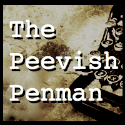I only just sat down with my laptop though I've been up since 5:30. Our minion had her tonsils out this morning, and she's quite miserable right now. I got her the wrong popcicles, nobody can find the bottle of Ibuprofen, she's hungry but she can't eat, so that shortens her already short temper. All we can do is what we did when she was just a grumpy baby--give her mac & cheese

and park her in front of the television. So in honor of Lindy and all the television she'll be watching, I've made a list of 5 Kick Ass Women Guaranteed To Make You Smile.
Babs Bunny
Well, she's sort of a woman, and she definitely fulfills the most important criteria of this list, namely kicking ass. She's funny without being obnoxious, mischievous without a cruel streak (except once and she learned her lesson), always sticks by her friends and stands up for herself. She still makes me laugh, and very few things I loved when I was ten still has that effect.
Memorable Quote [lost in New York]
They'll make a TV movie out of this starring Eve Plumb! 'Babs: Portrait of a Teenage Toon'!
Maude
We actually haven't seen too many episodes of Maude, but it doesn't matter, because every episode we've seen is packed full of gems. The series itself is pretty boring, though Rue McLanahan is great, of course. But even if the episode is slow, Bea Arthur's performance and timing is always perfect. The other day we caught an episode on TV, and she casually mentions calling somebody she met when she was "running for the state Senate." You never hear women on television casually mention the time they campaigned to be a senator.
Memorable Quote
Maude: When he says wife, he means possesion.
Walter: So what, Maude? You told me a hundred times you wanted to be possessed.
Maude: Walter Findlay, I never said that standing up and you know it!
Dorothy Zbornak
It's a Bea Arthur twofer. I can't help it. Bea Arthur is my hero. I hope to be her when I grow up. If that's not possible, I'll settle for her timing and trademark growl. I've admired Dorothy my entire life (that might explain a lot actually). The Golden Girls is one of the funniest sitcoms ever--I've done the research--and Dorothy had all the best lines. She didn't suffer fools, she was confident but still had her insecurities, she loved her mother and her friends, and she could deliver a line as dry as the Sahara.
Memorable Quote
Rose: Can I ask a dumb question?
Dorothy: Better than anyone I know.
Dana Scully
There are many, many, many, many reasons to love Gillian Anderson and her character, as we all know, so I'll leave it at that. But my favorite thing about Scully was her understated but undeniable sense of humor. The teasing comments accompanied with a wry twist of her lips, the small smiles Mulder coaxed from her, and of course, the casual way she ate a cockroach. She makes me laugh every time I watch Bad Blood, the Rashomon-style episode about vampires.
Memorable Quote
Last time you were so engrossed, it turned out you were reading "Adult Video News."
Buffy Summers

Of course she had to be on the list, because she's the best. Smart, strong, funny, and can literally take on anything and kick its ass. The only thing more legendary than her skill are her quips, and quotes from
BtVS have infiltrated my daily language like cliches and Biblical metaphors. I don't think there's a better cure for what ails you than curling up under a blanket and watching twelve solid hours of episodes like
Band Candy, Lover's Walk, or
Superstar.
Memorable Quote
The Master: You're dead.Buffy: I may be dead, but I'm still pretty. Which is more than I can say for you.The Master: You were destined to die! It was written!Buffy: What can I say? I flunked the written.






 and park her in front of the television. So in honor of Lindy and all the television she'll be watching, I've made a list of 5 Kick Ass Women Guaranteed To Make You Smile.
and park her in front of the television. So in honor of Lindy and all the television she'll be watching, I've made a list of 5 Kick Ass Women Guaranteed To Make You Smile.
 Of course she had to be on the list, because she's the best. Smart, strong, funny, and can literally take on anything and kick its ass. The only thing more legendary than her skill are her quips, and quotes from BtVS have infiltrated my daily language like cliches and Biblical metaphors. I don't think there's a better cure for what ails you than curling up under a blanket and watching twelve solid hours of episodes like Band Candy, Lover's Walk, or Superstar.
Of course she had to be on the list, because she's the best. Smart, strong, funny, and can literally take on anything and kick its ass. The only thing more legendary than her skill are her quips, and quotes from BtVS have infiltrated my daily language like cliches and Biblical metaphors. I don't think there's a better cure for what ails you than curling up under a blanket and watching twelve solid hours of episodes like Band Candy, Lover's Walk, or Superstar.


















